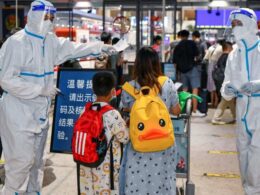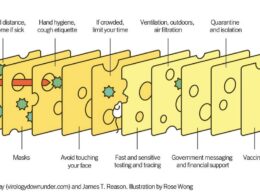health and tech institute
for continuous health transformation
Joaquim Cardoso MSc
Chief Researcher and Editor
January 2, 2023
EXECUTIVE SUMMARY
The world must prepare for a potential influenza pandemic as the likelihood of an outbreak is increasing due to population growth, climate change and increased contact between humans and disease-carrying animals.
The US National Academy of Medicine’s Advancing Pandemic and Seasonal Influenza Vaccine Preparedness and Response Initiative offers four consensus reports with recommendations for action. The four priority areas are:
- 1.building a sustainable global manufacturing network and supply chain for influenza vaccines,
- 2.incentivizing and investing in influenza research and development,
- 3.strengthening pathogen surveillance and monitoring, and
- 4.establishing regional, national, and global stockpiles of essential items.
The Initiative also recommends creating a permanent interdisciplinary task force within the G20 to coordinate vaccine manufacturing efforts.
The lessons learned from the COVID-19 pandemic should be leveraged, such as
- leveraging partnerships and new technology platforms, and
- improving global collaboration and data sharing around emergent viruses.
DEEP DIVE
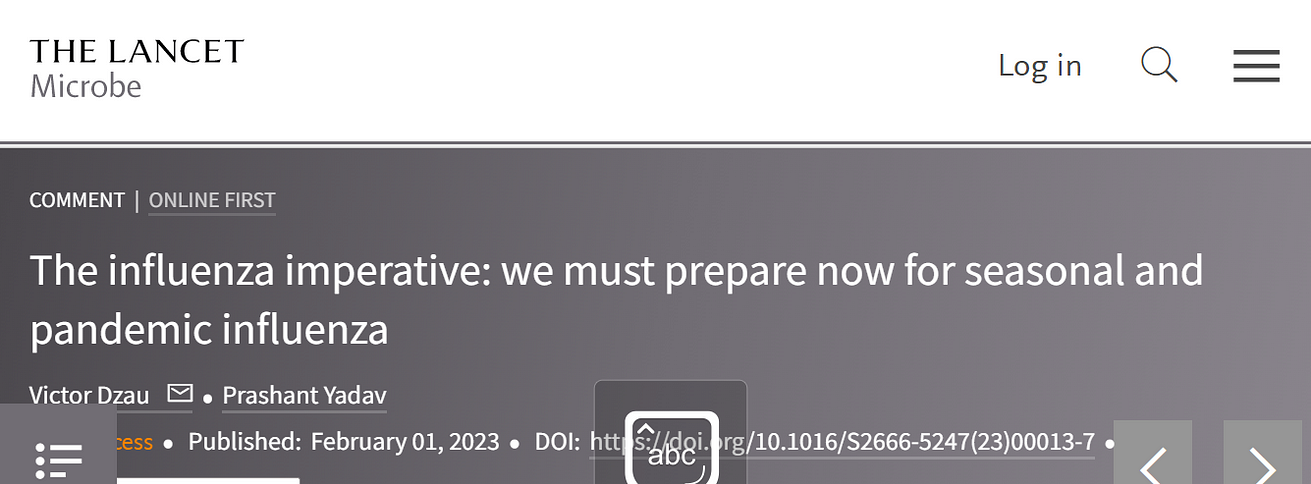
The influenza imperative: we must prepare now for seasonal and pandemic influenza
The Lancet
Victor Dzau, Prashant Yadav
February 01, 2023
The 1918 influenza pandemic, the deadliest in modern history, killed an estimated 50 million people worldwide. This is about eight times as many people as COVID-19 has killed to date.
Unless we are appropriately prepared, a pandemic on that scale could happen again. Intense viral outbreaks are increasing rapidly because of factors such as population growth, climate change, and increasingly frequent contact between humans and disease-carrying animals.
Influenza viruses are zoonotic in origin and mutate rapidly, regularly creating novel viruses in humans, but the public tends to downplay the seriousness of influenza owing to its seasonal nature and conflation with the common cold. These factors, taken together, have led many experts to believe it is almost certain the world will experience a major influenza pandemic.
Despite all that was learned from the COVID-19 pandemic, the world is nowhere near ready for an influenza pandemic and must increase our preparations now, and with all urgency.
Fortunately, the scientific community and global health experts know what needs to be done.
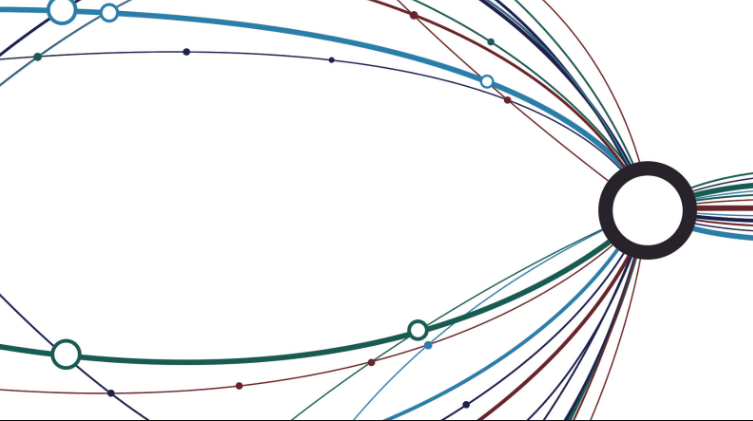
The US National Academy of Medicine’s Advancing Pandemic and Seasonal Influenza Vaccine Preparedness and Response Initiative provides an in-depth description of the actions required.
The Initiative was launched in 2020 to collect, understand, and leverage lessons learned from COVID-19, to ensure robust and effective preparedness for the next influenza pandemic. The Initiative produced four consensus study reports, focused on vaccine research and development, globally resilient supply chains, public health interventions, and global coordination and financing.
The Initiative’s four consensus reports offer specific recommendations, which (if implemented) will advance the global preparedness movement.
These recommendations, many of which build on longstanding initiatives by WHO and other global entities, fall into four high-priority action areas.
The first priority is to build a sustainable global manufacturing network and supply chain for influenza vaccines.
A reliable and robust supply chain and manufacturing network are the foundation for any pandemic response. The COVID-19 pandemic revealed how ill-prepared global supply chains and manufacturing networks were to meet the needs of a protracted pandemic response, especially for vaccines but also for hundreds of other necessary items, such as personal protective equipment and therapeutics. More than 2 years into the pandemic, low-income and middle-income countries around the world still struggle to immunise their populations because they cannot obtain and distribute enough vaccines, owing to factors that include the inadequacy of annual vaccination programmes, distribution inequities, supply chain shortages, logistical hurdles, inadequate manufacturing capacity, and vaccine hoarding in countries with surpluses.
Expanding the geographical distribution of vaccine production centres, combined with a strong and well coordinated global supply chain and manufacturing network, will be crucial in responding to an influenza pandemic and will help to achieve global vaccine equity. Initiatives to establish new vaccine and biologics manufacturing sites in regions without any such capacity in the past have been started, but their sustainability depends on coordination, both from the supply side (for input materials and supplies) and on the demand side, which must be created via purchasing commitments (as occurred with the seasonal influenza vaccine market in the USA). To help ensure network and supply chain preparedness, the Initiative recommends that the G20 constitute a permanent, global, and interdisciplinary task force whose first crucial step would be to coordinate the efforts of major vaccine-manufacturing nations.
Related is the need to establish regional, national, and global stockpiles of essential items (eg, antivirals, antimicrobials, oxygen, and diagnostic tests) to ensure equity of access in a pandemic scenario. This action should be done in such way as to ensure equitable capacity and distribution, with coordination (if needed) by WHO, UNICEF, and other global actors each working closely with regional bodies.
Second is the need to incentivise and invest in influenza and respiratory pathogen research and development.
Research on influenza pathogens has not been prioritised in the past two decades despite the high likelihood of an influenza pandemic and the yearly mortality that arises from seasonal influenza. Currently, seasonal influenza vaccines in the USA reduce the likelihood of symptomatic illness by only 40–60%, offering substantial room for improvement.
History shows that heightened concern and attention during an outbreak quickly recede, as already seen in the public sentiment around the ongoing COVID-19 pandemic. Now is the time to capitalise on the many lessons learned, best practices, and novel technology platforms arising from the rapid development of effective and safe COVID-19 vaccines, before the next pandemic emerges. The COVID-19 pandemic also catalysed new relationships and partnerships that fostered unique insights and breakthroughs that should be better understood and leveraged.
It is also important to strengthen pathogen surveillance and monitoring. A One Health approach to surveillance would include a dedicated focus on pathogens in wildlife, livestock, and animals sold at markets. Such a system would provide early warnings for pathogens that have a pandemic potential that could jump from animals to humans, such as the H5N1 strain currently spreading among the world’s bird populations.
Comprehensive monitoring systems need to provide information that is accurate, timely, and comprehensive, and should be recognised as a global public good.
This broad surveillance infrastructure should be linked with accurate, rapid, and harmonised global reporting of data on novel viruses. As seen with the COVID-19 pandemic, the benefits gained from global collaboration and data sharing around an emergent virus need to be preserved. Although sharing the genetic sequencing of emerging viruses is a complex issue, protocols already exist, and should be examined to ensure they provide the most benefit to all.
Third, there is a need for sustainable and reliable funds for research and development, tools, preparedness, and vaccine uptake, as without such financing, none of the research, innovation, or actions needed to prepare for the next influenza pandemic will be possible.
Global financing for pandemic preparedness, response, and recovery should consider and address the needs of all countries and populations, especially those with few resources. Every nation has a role, whether through surveillance, sample collection, stockpiling and production of necessary resources, workforce training, participation in data sharing with other nations, or other means. The establishment of a financial intermediary fund hosted at the World Bank, with over US$1 billion committed to the fund from countries and donors across the globe, is welcome. This type of fund is necessary to ensure that the broad range of efforts needed to ensure global pandemic preparedness are properly resourced, although the amount currently pledged is not nearly enough. Countries across the world should contribute to this fund, as a global effort is needed to ensure a global response to both seasonal influenza and any future pandemic.
Fourth is the need to build trust, improve communications, and implement interventions.
The COVID-19 pandemic showed the need for clear, consistent, and trusted communications, especially when misinformation goes viral. All other preparations will be irrelevant if people refuse vaccines or ignore public-health safety precautions. Building (or rebuilding) trust across the globe among the public, the authorities managing the pandemic responses, and scientific and medical leaders is needed to ensure an effective, coordinated response to the next pandemic. Better, clearer, and more coordinated communications than existed for COVID-19 are needed from those in power. Equally important is gaining broad agreement from policymakers that responding to public health crises requires working in partnership. The building of trust depends on funding, commitment, intention, and time to develop, and must begin immediately if there is to be a nimble and effective response to the next pandemic.

The devastating potential and likelihood of occurrence of a major influenza pandemic are frightening.
As the world continues to address the impacts of COVID-19, it must build on what has been learned since 2020 and begin urgent preparations to guard against the next pandemic, especially one caused by influenza.
The priority actions are clear: build up supply chains and manufacturing networks; invest immediately and substantially in pathogen surveillance and influenza and respiratory virus research; and prepare to ensure the equitable distribution of necessary resources, including vaccines, when the next pandemic strikes.
These steps will require national and international leadership, collaboration, commitment, and human and financial resources. The world must not let the hard-won lessons from the COVID-19 pandemic go to waste. The alternative is too devastating to contemplate.
About the authors & affiliations
VD and PY are co-chairs of the international committee of the US National Academy of Medicine’s Advancing Pandemic and Seasonal Influenza Vaccine Preparedness and Response Initiative. VD is employed by the US National Academy of Medicine, which did the initiative and consensus studies referenced in this Comment. PY is on the access and sustainability advisory committee of Novo Nordisk; provided subject matter expertise to a consultancy firm whose clients include large global pharmaceutical companies; and his employer received grants from the Bill & Melinda Gates Foundation and Open Philanthropy.
Originally published at https://www.thelancet.com.
REFERENCE PUBLICATION
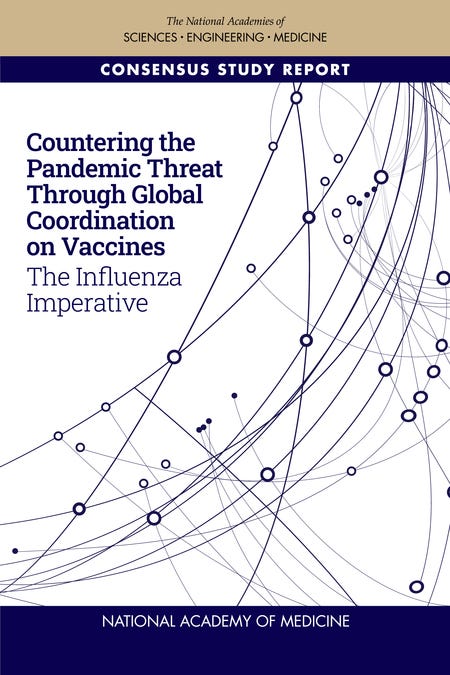
Suggested citation:
National Academies of Sciences, Engineering, and Medicine. 2022. Countering the pandemic threat through global coordination on vaccines: The influenza imperative. Washington, DC: The National Academies Press. https:// doi.org/10.17226/26284
Study Staff
JANELLE WINTERS,
Study Director
CLAIRE MOERDER,
Research Associate (until June 2021)
ERIKA JAUREGUI, Research Associate (from June to August 2021)
INEZ ADAMS, Research Associate (from June to August 2021)
TOCHI OGBU-MBADIUGHA, Senior Program Assistant (from April 2021) EMILIE RYAN-CASTILLO, Senior Program Assistant
PATRICIA A. CUFF, Senior Program Officer, Board on Global Health
JULIE A. PAVLIN, Senior Director, Board on Global Health
FRANCES SHARPLES, Science Writer
ROGER YAT-NORK CHUNG, National Academy of Medicine International Health Policy Fellow Consultant
ANNA NICHOLSON, Science Writer







